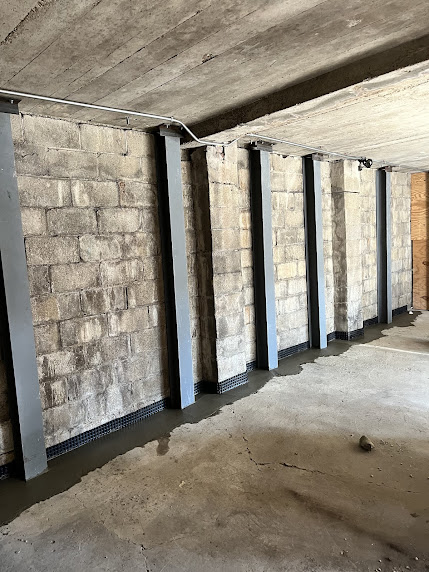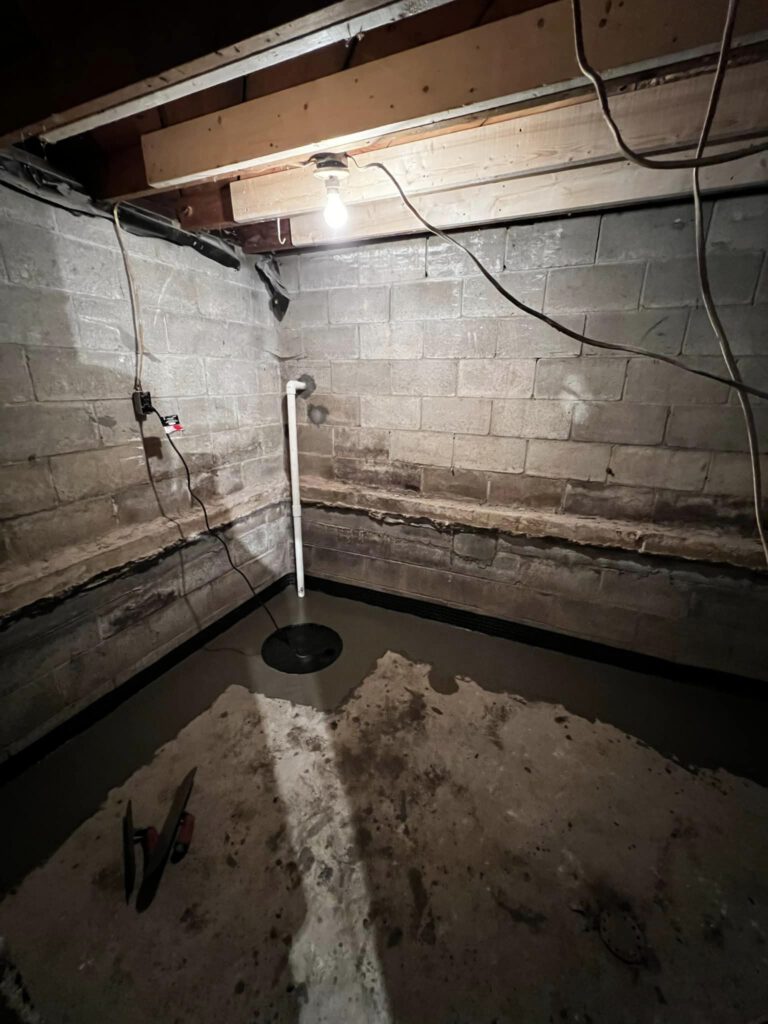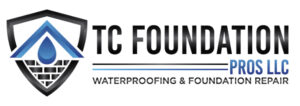When considering waterproofing your basement, you may wonder about the associated costs. Understanding the factors that influence pricing is essential for making informed decisions. From the size of your basement to the materials used, various elements can impact the overall cost. But what about the hidden expenses that often catch homeowners off guard? Exploring the intricacies of basement waterproofing costs can shed light on how to navigate this essential home improvement project effectively.
Key Takeaways
- Basement size impacts overall waterproofing cost due to varying surface areas.
- Quality materials offer long-term protection with warranties for durability.
- Labor costs vary based on expertise, job complexity, and team size.
- Structural damage repairs, like sealing cracks, can escalate expenses.
- Exterior vs. interior waterproofing costs differ based on materials, labor, and long-term maintenance needs.

Average Cost of Basement Waterproofing
When thinking about the average cost of basement waterproofing, it’s important to take into account the size of your basement and the extent of the waterproofing required. Cost comparisons across different providers reveal price variations that can greatly impact your budget. Understanding the factors influencing these costs is essential for making informed decisions.
The cost of basement waterproofing can vary based on the size of your basement. Larger basements may require more materials and labor, thereby increasing the overall cost. Additionally, the extent of waterproofing needed plays a vital role in determining the final price. If your basement has existing water damage or requires extensive repairs, the cost is likely to be higher compared to preventive measures.
When comparing costs, it’s essential to take into account the quality of materials and services offered by different providers. While some companies may offer lower prices, the quality of their work may not be up to standard. Investing in high-quality waterproofing can save you money in the long run by preventing costly repairs due to water damage.
Price variations in basement waterproofing can also be influenced by the location of your property and the complexity of the job. Areas with higher labor costs or unique structural challenges may result in higher prices. By researching and obtaining multiple quotes, you can make sure that you’re getting a fair price for the waterproofing services you require.
Factors Influencing Waterproofing Costs
When considering the factors that influence waterproofing costs, it’s essential to evaluate the impact of:
- Material quality
- Labor and expertise
- The extent of structural damage repair required
The quality of materials used can greatly affect the overall cost, as superior products often come at a higher price point but may offer better long-term protection. Additionally, the level of skill and experience of the labor force involved in the waterproofing process can also influence costs, as more specialized expertise may command higher wages. Structural damage repair, if necessary, can further escalate expenses, as addressing underlying issues can be complex and time-consuming.
Material Quality Impact
The quality of materials used in basement waterproofing greatly impacts the overall cost of the project. High-quality materials may initially seem more expensive, but they offer long-term benefits such as increased material longevity and cost-effectiveness.
Investing in superior materials can lead to a more efficient waterproofing system, reducing the need for frequent repairs or replacements. Additionally, premium materials often come with a waterproofing warranty, providing you with added assurance and protection.
These materials are designed for durability, ensuring that your basement remains safeguarded against water damage for an extended period. While the upfront costs may be higher, the long-lasting effectiveness of superior materials makes them a wise choice for ensuring the longevity and resilience of your basement waterproofing system.
Labor and Expertise
Labor and expertise play pivotal roles in determining the overall cost of basement waterproofing projects. The skill level of the professionals you hire and their expert opinion can have a substantial impact on the final expenses. Here are some key points to keep in mind:
- Skill Level: Highly skilled waterproofing specialists may charge more but can deliver superior results.
- Expertise: Look for professionals with a proven track record in basement waterproofing for best outcomes.
- Efficiency: Productive workers can complete the project faster, potentially reducing labor costs.
- Training: Continuously trained professionals are likely to be well-versed in advanced techniques and technologies.
- Consultation: Initial expert consultation might involve costs but can save money in the long run by identifying the best waterproofing solutions.
Structural Damage Repair
To accurately assess the impact of structural damage on waterproofing costs, understanding the extent of the issues is essential. Foundation cracks are a common source of water infiltration in basements. Repairing these cracks involves injecting epoxy or polyurethane foam to seal them effectively. The cost varies depending on the number and size of cracks present.
Additionally, concrete sealing is vital for preventing water seepage through porous surfaces. This process involves applying waterproof sealants to the concrete walls and floors to create a protective barrier against moisture intrusion.
The extent of structural damage, whether it be minor cracks or more severe foundation issues, directly influences the complexity of the repair and consequently impacts the overall waterproofing costs significantly.
Types of Waterproofing Materials
When selecting waterproofing materials, consider their durability and effectiveness in preventing water infiltration. There are various types of materials available for basement waterproofing, each with its own unique properties and benefits.
Here are some common types of waterproofing materials:
- Waterproofing Membranes: These are thin layers of material applied to the exterior walls of the basement to create a barrier against water penetration. They can be made of asphalt, rubberized asphalt, or thermoplastic materials.
- Drainage Systems: These systems are designed to collect and redirect water away from the foundation of the basement. They can include interior drains, exterior drains, sump pumps, and French drains.
- Elastomeric Coatings: These coatings are flexible and can stretch to accommodate the natural movement of the building structure. They’re often used on concrete walls to prevent water seepage.
- Cementitious Waterproofing: This type of waterproofing material is a cement-based mixture that’s easy to apply and provides a durable barrier against water.
- Silicate Sealers: Silicate sealers penetrate deep into the concrete walls and form a chemical barrier that prevents water from entering while still allowing the walls to breathe.
Choosing the right waterproofing material for your basement is vital in ensuring the long-term protection of your home against water damage. Each type has its own advantages and is suited for different situations, so it’s important to assess your specific needs before making a decision.

Labor Costs for Basement Waterproofing
When it comes to labor costs for basement waterproofing, understanding the breakdown of these expenses is essential. Factors such as the size of the basement, the extent of damage, and the chosen waterproofing method can all impact the overall pricing.
Labor Costs Breakdown
The labor costs breakdown for basement waterproofing provides a detailed analysis of the expenses incurred for hiring professionals to complete the necessary tasks. When evaluating labor costs, focusing on labor efficiency and implementing cost-saving techniques can greatly impact the overall expenses.
Here are some key aspects to take into account:
- Specialized Skills: Hiring professionals with specific expertise in basement waterproofing can guarantee quality work.
- Equipment Costs: Some contractors include equipment expenses in their labor costs, while others may charge separately.
- Labor Intensity: The complexity of the waterproofing job can influence the labor costs involved.
- Timeframe: Faster completion times may lead to higher labor costs due to increased labor efficiency.
- Team Size: The number of workers assigned to the project can impact labor costs.
Factors Affecting Pricing
Taking into account various aspects such as specialized skills, equipment costs, labor intensity, timeframe, and team size is essential when analyzing factors affecting pricing in basement waterproofing labor costs. Different waterproofing methods can influence labor costs; for instance, interior sealants are less labor-intensive than exterior excavation. The choice of method impacts the required skills and time investment, thereby affecting pricing.
Additionally, comparing waterproofing methods can help determine the most cost-effective solution for your basement. Implementing cost-saving techniques, like addressing issues promptly and preventing further water damage, can influence labor costs positively. By understanding the intricacies of waterproofing labor costs, homeowners can make informed decisions to protect their basements effectively while managing expenses efficiently.
Cost of Exterior Vs. Interior Waterproofing
For homeowners seeking to address basement waterproofing, comparing the cost between exterior and interior methods is important for making an informed decision. When evaluating the expenses associated with exterior versus interior waterproofing, it’s vital to take into account various factors that can impact the overall cost.
Here is a breakdown to help you understand the cost disparities between these two methods:
- The extent of Waterproofing Needed: The amount of waterproofing required plays a significant role in determining the cost. Exterior waterproofing often involves more extensive work, which can increase the overall expenses.
- Labor Costs: Labor expenses differ between exterior and interior waterproofing methods. Exterior waterproofing usually requires more labor-intensive work, impacting the total cost.
- Materials Used: The materials utilized in exterior and interior waterproofing can vary in cost. Understanding the quality and quantity of materials needed is essential in evaluating the overall expenses.
- Structural Considerations: The structural complexity of your basement can affect the cost of waterproofing. Factors like foundation type and accessibility can influence the overall pricing.
- Long-Term Maintenance: Take into account the long-term maintenance costs associated with each method. While exterior waterproofing may have higher upfront costs, it could potentially save money in the long run by reducing the need for frequent repairs.
Additional Expenses to Consider
Considering the extensive scope of basement waterproofing, it’s important to factor in additional expenses beyond the primary waterproofing methods. When evaluating these costs, two important aspects to take into account are drainage systems and landscaping. Proper drainage is vital in preventing water buildup around the foundation of your home. Installing or improving drainage systems may involve expenses related to materials, labor, and machinery. Landscaping adjustments might also be necessary to make sure water is directed away from the foundation, which could include regrading the soil or adding features like French drains.
Foundation repair is another potential expense that could arise during the waterproofing process. If water damage has already affected the foundation, repairs may be needed to guarantee its structural integrity. Costs for foundation repair can vary significantly depending on the extent of the damage and the materials required.
Mold remediation is an important consideration when waterproofing a basement. Moisture seepage can create an environment conducive to mold growth, which poses health risks and can damage your property. Professional mold remediation services may be necessary to address any existing mold issues and prevent future growth. The costs associated with mold remediation can depend on the size of the affected area and the severity of the infestation. Properly addressing mold concerns is essential for maintaining a healthy living environment and preserving the integrity of your home.
DIY Vs. Professional Waterproofing Costs
Wondering whether to tackle basement waterproofing on your own or hire a professional? When weighing the decision between DIY and professional waterproofing, various factors come into play. Here’s a breakdown to help you decide:
- DIY Savings: Opting for a do-it-yourself approach can lead to significant savings in upfront costs as you eliminate labor expenses.
- Professional Benefits: Hiring a professional guarantees expertise in identifying the root cause of the issue and implementing effective waterproofing solutions.
- Cost Comparison: While DIY may seem cost-effective initially, professional services often provide long-term cost savings by preventing potential water damage and mold growth.
- Long-Term Investment: Professional waterproofing is a long-term investment in the structural integrity of your home, potentially increasing its overall value.
- Quality Assurance: Professionals use specialized tools, materials, and techniques to ensure a high-quality waterproofing job, offering peace of mind and a warranty for their work.
Considering the DIY savings against the professional benefits, it’s essential to assess the complexity of the waterproofing required and your skill level before deciding. While DIY may save money initially, professional waterproofing offers expertise, long-term investment benefits, and quality assurance that may outweigh the initial cost difference in the future.
Cost-Effective Basement Waterproofing Solutions
When seeking cost-effective basement waterproofing solutions, prioritizing efficiency and durability is essential to ensure long-lasting protection against water intrusion. To achieve this, consider budget-friendly options that offer long-term benefits.
One affordable solution is to use quality materials such as waterproof sealants. These sealants create a barrier against moisture, preventing water from seeping through the walls or floors of your basement.
Another cost-effective method is to improve the grading around your home. Ensuring that the ground slopes away from the foundation can help prevent water from pooling near the basement walls, reducing the risk of leaks. This simple yet effective solution can save you money in the long run by minimizing the need for extensive waterproofing repairs.
Additionally, installing a sump pump can be a wise investment for maintaining a dry basement. While initially requiring some upfront cost, sump pumps are durable and efficient in removing excess water from your basement, thereby preventing potential water damage.
Final Thoughts
When considering basement waterproofing costs, it’s essential to factor in various elements such as materials, labor, and the extent of waterproofing needed.
By carefully evaluating these factors and exploring cost-effective solutions, you can guarantee your basement remains protected against water damage.
Remember, investing in high-quality waterproofing can save you from costly repairs in the future.
So, make an informed decision and safeguard your basement today.
